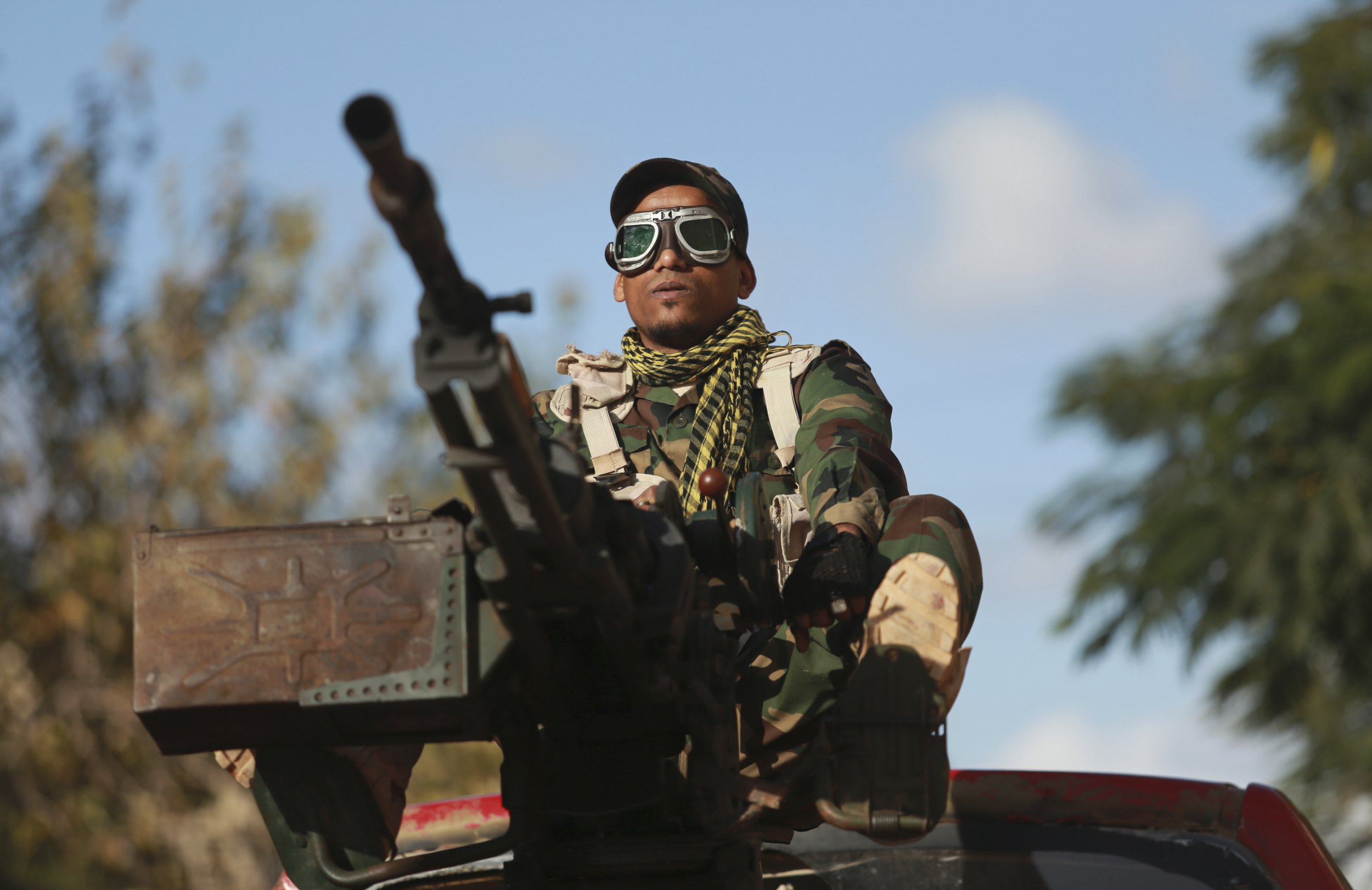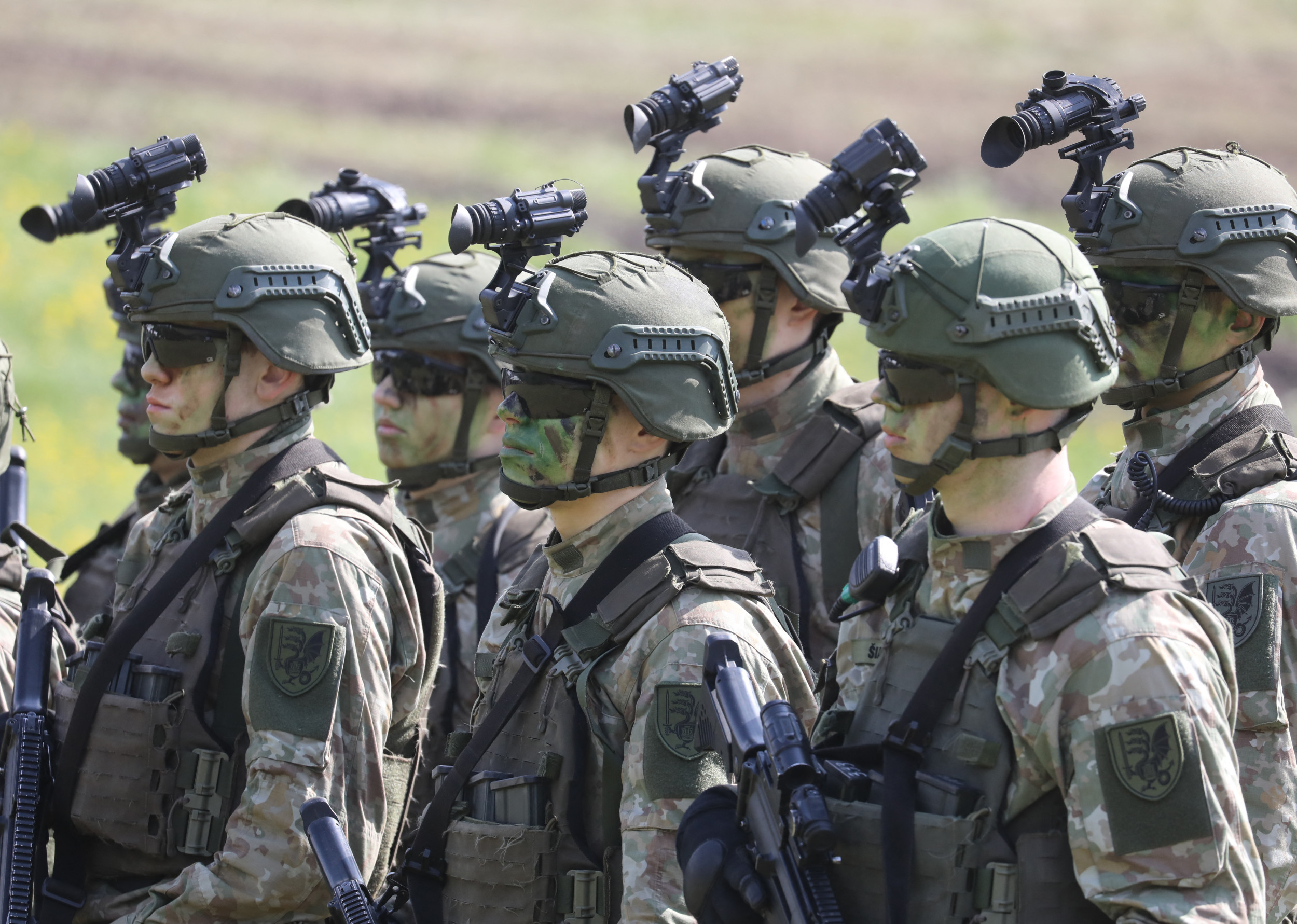
Since the fall of longtime strongman Muammar el-Qaddafi, Libya has descended into chaos, with rival factions vying for power and influence across the country.
This week, members of the country's warring factions met in Geneva for the first round of United Nations-brokered peace talks. The goal: to form a unity government and stop the fighting between Islamist and largely secular political groups. The talks concluded on Thursday night, and a new round will take place in Geneva next week.
Since December, the U.N. has been trying to establish a dialogue between the two sides. It's part of a last-ditch effort to solve what seems to be an increasingly intractable conflict. But only one side has officially embraced the peace talks, and many critical parties refused to attend the first round.
In an interview with Newsweek, Wayne White, a scholar with the Middle East Institute and former deputy director of the State Department's Middle East intelligence office, spoke about what the Libyan crisis means for the rest of the world and why the media doesn't seem to be paying any attention.
Who are Libya's two main warring factions?
One is the largely secular and internationally recognized government headed by Prime Minister Abdullah al-Thani, who was elected in June. In August, al-Thani and his cohorts, including Libya's House of Representatives, fled the capital city of Tripoli for Tobruk, some 780 miles away, as a rival group of Islamist politicians drove them out. Led by Omar al-Hassi, this group now controls Tripoli and has chosen a new parliament. The source of their strength is an Islamist militia called Libya Dawn.
For months now, al-Hassi has been saying that Libya needs new elections and that al-Thani's parliament has lost legitimacy. But experts say al-Hassi opposes peace talks because they could weaken his government.
"There's still going to be the problem of luring the Islamist pretender government to these talks," White says. "It suspects, quite credibly, that the ideal conclusion for the Western powers with these talks is their elimination or their de-legitimization."
Who is Libya Dawn and how are they different from Libya's other Islamist militias?
Libya Dawn is a group of hardened militia fighters that back the self-declared government of al-Hassi in Tripoli. It's a nationalist organization that has no external connections to other Islamist fighters.
Ansar al-Sharia, on the other hand, is Al-Qaeda's offshoot in Libya. That group dominates the city of Benghazi, controlling vast swaths of the city, despite frequent attempts by the Libyan national army to dislodge them.
There are a variety of other Islamist groups as well, from ISIS-connected organizations such as Ansar al-Sharia Derna in the city of Derna to another Al-Qaeda offshoot, Al-Qaeda in the Islamic Maghreb, which operates in the country's southwest.
Libya Dawn, according to White, is far more moderate than these groups. "[It] denounces all of them," he says.
Why has there been no further Western military intervention in Libya?
The ongoing civil war in Syria and the emergence of ISIS remain the region's most intractable problems. They've captured most of the West's focus, which is why Libya has been put on the back burner. Political turmoil in Egypt has also preoccupied the Western powers, especially after President Abdel-Fattah el-Sissi overthrew his Islamist rival, Mohammed Morsi, the country's first democratically elected president.
The lone exception in the West is France, which has prioritized the problems in Libya since late 2013 and has been acting mostly alone to contain the violence. But with the recent attacks in Paris, France will likely join the rest of the world in turning its attention now to Yemen, the stronghold of Al-Qaeda in the Arabian Peninsula, which claimed responsibility for the Paris terrorism.
"The French will probably also ramp up their effort against the Islamic State, although what we're hearing now, so far, is that France is still reluctant to extend its airstrikes against ISIS into Syria," says White.
What will happen if the peace talks don't pan out?
If the peace talks aren't successful, the fighting will continue. But even the economics don't work in favor of Libya in terms of getting attention from the international community. Libya's oil production is down to 300,000 barrels a day, while before the 2011 civil war capacity was at least 1.65 million. Libyan oil has been absent from the market for at least a year, and with oil prices already low, no one is champing at the bit to reopen the country's oil terminals.
In December, militants belonging to Libya Dawn pushed east and launched rockets at the oil port of Al-Sidra, setting an oil storage tank ablaze in a surprise attack against forces backing the legitimate government.
But a more disturbing scenario is a sort of Syria redux, in which extremist groups join the fray, widening and further radicalizing the conflict. Already that seems to be happening. Says White, "We've seen the radical portions of the city of Derna, which even during the days of Qaddafi was a hotbed for Islamist militant activity against his regime, declare allegiance to the Islamic State."
Why is the war in Libya a problem for countries outside the region?
The situation is Libya is causing another huge refugee crisis in the region. More than 2 million refugees are living in Tunisia, according to Tunisian President Moncef Marzouki, and Libya has more than 454,000 internally displaced people. While data from the U.N. refugee agency shows only 3,353 refugees registered in Tunisia as of mid-2014, the millions of reported refugees likely haven't registered with the U.N. and are staying with family or other hosts.
But the problem extends beyond displaced people. In Mali, Islamist militias have infiltrated the country and nearly overthrown the government. In Niger, located southwest of Libya, similar groups have raided and threatened the government and flooded the area with guns, forcing France to step in to try to control the problem.
But perhaps the biggest fear is Egypt. Extremists and war profiteers in Libya have been successfully smuggling weapons across the border, especially into Sinai, where ISIS-linked rebels have attacked government forces and even launched cross-border attacks against Israel.
"The Egyptian-Libyan border is huge," says White, "The Egyptians have shown over the last year that they do not have the resources to hold and control [it]."
Why has there been limited media coverage, and why is this dangerous?
As Western governments continue to focus on ISIS, so does the media. The terrorist group has successfully used social media to keep its brand in the news, beheading its captives and kidnapping women and girls and turning them into sex slaves.
The situation in Libya makes for a far less clickable headline, and apart from the 2012 Benghazi attack on the U.S. Embassy that killed U.S. Ambassador Christopher Stevens and three others, it's received scant attention. Many outlets have also failed to grasp that security is deteriorating in Libya as the country's two main factions continue to feud. Or that the implications are dangerous.
"To a lot of the media outside, what has been going on in Libya looks like a lot of the same," White says. "I think they see a maddening maelstrom of instability out of which they can see few patterns, unless you start really looking at it."
Uncommon Knowledge
Newsweek is committed to challenging conventional wisdom and finding connections in the search for common ground.
Newsweek is committed to challenging conventional wisdom and finding connections in the search for common ground.
About the writer
Before joining Newsweek, Lucy Westcott was an editorial fellow at The Wire. Previously a United Nations correspondent for the Inter ... Read more
To read how Newsweek uses AI as a newsroom tool, Click here.





